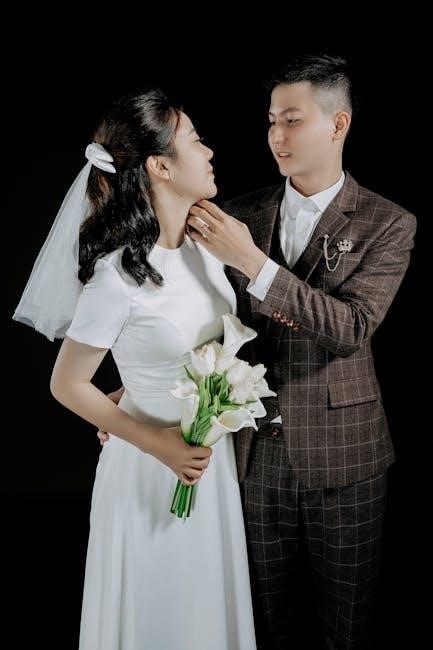A contract marriage story explores the emotional journey of a couple bound by societal expectations, legal obligations, and hidden desires, revealing the complexities of love and commitment.
Overview of the Plot
The story revolves around a couple entangled in a contract marriage, a union born out of necessity rather than love. Initially, the arrangement appears harmonious, with both parties fulfilling their duties without emotional attachment. However, cracks begin to surface when the wife discovers her husband’s infidelity, shattering the facade of their convenient relationship. Torn between societal expectations and personal dignity, she decides to end the marriage, sparking a chain of events that exposes the deeper emotional struggles of both characters. The plot delves into themes of trust, betrayal, and the societal pressures that often dictate the course of marriages. As tensions escalate, the husband grapples with the consequences of his actions, while the wife seeks to reclaim her independence and self-worth. The narrative builds toward a climactic confrontation, forcing both characters to confront their true feelings and the uncertain future of their relationship.
Main Characters and Their Roles
The story centers around two primary characters: the wife, a strong-willed and independent woman, and her husband, a reserved and duty-bound man. The wife, determined to protect her dignity and rights, emerges as the emotional core of the narrative, driving the plot forward with her decisions. Her husband, initially portrayed as loyal, struggles with his own desires and societal expectations, leading to a betrayal that fractures their relationship. Secondary characters, such as family members and legal advisors, play pivotal roles in influencing their choices and amplifying the tension. The husband’s mistress serves as a catalyst for the conflict, while the wife’s support system, including friends and lawyers, provides her with the strength to navigate the challenges. Together, these characters create a complex web of emotions, obligations, and moral dilemmas that define the story’s progression.

The Concept of a Contract Marriage
A contract marriage is a union based on mutual agreements, often rooted in practicality rather than romance. It involves legal and societal obligations, where emotions are secondary to the terms set by the arrangement. In this story, the contract marriage serves as a foundation for exploring themes of convenience, duty, and hidden desires. The couple agrees to the union for reasons such as financial stability, social status, or family pressures, with clear expectations outlined to avoid misunderstandings. However, as the narrative unfolds, the emotional toll of such a marriage becomes evident. The arrangement often leads to internal conflicts, as one or both parties may struggle with unmet emotional needs or suppressed love. This type of marriage highlights the tension between societal expectations and personal happiness, creating a complex dynamic that drives the story forward.

Themes and Emotional Depth
The story delves into themes of love, trust, and societal pressure, exploring the emotional struggles of a contract marriage and the tension between personal desires and societal obligations.

Love vs. Convenience in Marriage

The story examines the delicate balance between romantic love and the practicality of convenience in marriage. Contract marriages often prioritize societal expectations, financial stability, and family obligations over emotional connection. This tension is central to the narrative, as the protagonists navigate their arranged union, questioning whether love can flourish in a relationship rooted in convenience. The male protagonist, driven by duty and responsibility, struggles with his growing feelings for his wife, while she grapples with the emptiness of a loveless partnership. As their relationship evolves, the story highlights the internal conflict between adhering to societal norms and pursuing true emotional fulfillment. Ultimately, the narrative challenges the notion that marriage can thrive without love, emphasizing the importance of genuine connection in overcoming the superficiality of a contract marriage.
Trust and Betrayal in Relationships
Trust and betrayal form a pivotal theme in the story, as the couple navigates the fragile foundation of their contract marriage. Initially, trust is scarce, with both partners harboring secrets and doubts. The male protagonist’s past infidelity and the female protagonist’s hidden desires create a volatile dynamic, leading to moments of betrayal that threaten to dismantle their relationship. The narrative explores how trust, once broken, can be challenging to rebuild, yet it also shows the possibility of redemption through honesty and vulnerability; Betrayal, whether real or perceived, becomes a catalyst for emotional growth, forcing the characters to confront their flaws and insecurities. The story underscores the delicate balance required to sustain trust in a relationship, highlighting the consequences of betrayal and the strength needed to overcome it. This theme resonates deeply, making the characters’ journey both relatable and poignant.
The Role of Society in Shaping Marriages
Society plays a significant role in shaping the marriage dynamics in the story, often imposing expectations that influence the couple’s decisions. Cultural norms and family pressures frequently dictate the terms of their union, with the male and female protagonists navigating a complex web of obligations. Societal judgment looms large, particularly when the marriage deviates from traditional norms, leading to stigma and emotional strain. The story highlights how external pressures can exacerbate internal conflicts, as the couple struggles to balance personal desires with societal demands. Family opinions further complicate the relationship, as approval or disapproval often sways their choices. The narrative underscores the tension between maintaining societal expectations and pursuing individual happiness, illustrating how these forces shape the marriage’s trajectory and emotional landscape. This theme resonates deeply, reflecting the universal challenge of balancing personal aspirations with societal norms.

Character Analysis
The story delves into the complexities of the male and female protagonists, exploring their motivations, inner conflicts, and the societal pressures shaping their roles in the contract marriage.
The Male Protagonist: Motivations and Conflicts
The male protagonist navigates a complex web of emotions, driven by a desire to maintain family unity while struggling with personal insecurities. His primary motivation stems from a deep-seated need to protect his son and preserve his relationship with his wife, even as societal expectations and legal battles complicate their bond. However, his inability to express emotions effectively leads to internal conflicts, often resulting in misunderstandings and strained communication. The pressure to conform to societal norms of masculinity further exacerbates his struggles, creating a rift between his true feelings and the facade he presents to the world. His journey is marked by moments of vulnerability and resilience, as he grapples with the consequences of his choices and the evolving dynamics of his marriage.
The Female Protagonist: Her Struggles and Desires
The female protagonist is a resilient yet emotionally vulnerable character, navigating the challenges of a contract marriage while yearning for genuine love and acceptance. Her primary struggle lies in reconciling societal expectations with her own desires, as she feels trapped in a union devoid of emotional connection. Despite her strength, she battles internal conflicts, often questioning her worth and the validity of her choices. Her desire for a meaningful relationship drives her to seek change, even as she faces opposition from those around her. The pressures of societal judgment and the constraints of her marital arrangement weigh heavily on her, pushing her to redefine her identity and seek a path that aligns with her true aspirations. Her journey is one of self-discovery, as she strives to balance resilience with the pursuit of happiness.
Supporting Characters and Their Influence
Supporting characters play a pivotal role in shaping the narrative of the contract marriage story, offering emotional support, societal pressure, and moral guidance. The female protagonist’s friends and family often serve as her confidants, providing solace and advice as she navigates her marital challenges. Conversely, societal figures like lawyers and judges embody the external pressures that complicate her journey. These characters highlight the tension between personal desires and societal expectations, influencing the protagonist’s decisions and the story’s progression. Their presence adds depth to the narrative, illustrating how external influences can both hinder and empower the protagonist. Through their interactions, the supporting characters reveal the broader societal context, making the protagonist’s struggles more relatable and impactful. Their roles are essential in driving the story forward and exploring themes of identity, loyalty, and resilience.

Emotional Elements of the Story
The narrative delves into intense emotional conflicts, exploring themes of love, betrayal, and sacrifice, while highlighting the tension between societal expectations and personal desires.
Building Tension and Emotional Conflict
The story masterfully constructs tension through the couple’s strained interactions, unspoken resentments, and the pressures of their arranged union. Emotional conflict arises as they navigate societal expectations.
Heartbreaking Moments and Their Impact
The story delves into poignant moments that leave a lasting emotional impact, such as the realization of a loveless union and the pain of custody battles. These scenes underscore the characters’ inner turmoil and the fragility of their relationship, highlighting the human cost of a contract marriage. The emotional weight of these moments reshapes their perspectives, forcing them to confront the consequences of their choices. The narrative effectively uses these heart-wrenching instances to deepen the audience’s connection to the characters, making their struggles feel intensely personal and relatable. Through these moments, the story emphasizes the sacrifices and vulnerabilities inherent in such arrangements, leaving a profound resonance long after the scene has passed.
The Role of Forgiveness and Reconciliation
Forgiveness and reconciliation serve as pivotal moments in the story, offering a glimmer of hope amidst the turmoil of a contract marriage. The characters grapple with past betrayals and misunderstandings, forcing them to confront their own flaws and vulnerabilities. Through heartfelt dialogues and emotional confrontations, the narrative explores the difficulty of letting go of resentment and the courage required to rebuild trust. These moments highlight the transformative power of forgiveness, allowing the characters to reconnect on a deeper level. However, reconciliation is not without its challenges, as old wounds resurface, testing the strength of their commitment. Ultimately, the story suggests that true reconciliation is a journey, not a destination, requiring constant effort and mutual understanding. These poignant scenes leave a lasting impact, underscoring the complexity of human relationships and the possibility of redemption.

Legal and Ethical Aspects
The story delves into the legal frameworks governing contract marriages, custody battles, and societal pressures, raising ethical questions about commitment, loyalty, and the moral dilemmas faced by the characters.
The Legal Implications of a Contract Marriage
A contract marriage often involves legally binding agreements that outline the terms of the union, including property rights, financial responsibilities, and custody arrangements. These agreements can provide clarity but also lead to legal disputes if either party breaches the contract. Divorce proceedings in such marriages may become more complicated, as the contract can influence custody battles and asset division. Societal expectations and family pressures often complicate the legal framework, as seen in the story where the protagonist faces judgment for her failed marriage. The legal system may favor one party over the other, particularly in cases involving wealth and social status. Understanding the legal implications is crucial for navigating the complexities of a contract marriage and ensuring fair outcomes for all involved.
Custody Battles and Their Emotional Toll
Custody battles in a contract marriage often escalate into emotionally draining conflicts, especially when children are involved. The legal system may favor one parent based on financial stability or societal expectations, adding stress to an already tense situation. The emotional toll on both parents and the child can be devastating, as each side fights for custody rights. This conflict often reflects deeper issues in the marriage, such as trust and betrayal, which may have led to the contract marriage in the first place. The child becomes a pawn in the legal battle, suffering long-term emotional effects. The story highlights how custody disputes can strain relationships further, making reconciliation difficult. The emotional impact of these battles lingers, affecting all parties involved and shaping the outcome of the marriage.
The Moral Dilemmas Faced by the Characters
The characters in the story grapple with significant moral dilemmas, particularly the wife, who must navigate the ethical complexities of a contract marriage. She faces internal conflicts between fulfilling her obligations and pursuing her genuine emotions, which often clash with societal expectations. The story delves into her struggle to maintain honesty and integrity while being bound by a marriage that lacks true emotional connection. Her decisions are further complicated by the fear of judgment and the potential consequences of revealing the truth. The moral dilemmas highlight the tension between duty and personal happiness, forcing her to make difficult choices that test her character and relationships. These ethical challenges underscore the emotional and psychological strain of maintaining a contract marriage, ultimately shaping her journey toward self-discovery and resolution.

Societal Pressures and Expectations
Societal norms enforce traditional roles, while family expectations and community scrutiny amplify the tension, forcing the couple to confront the weight of external judgment and its impact on their relationship.
The Judgment of Society on Failed Marriages

Society often harshly judges failed marriages, amplifying the emotional toll on the couple. In the story, the protagonist’s wife faces mockery and isolation after their divorce, highlighting societal expectations of marital perfection. The community’s scrutiny intensifies her pain, as she is labeled the “abandoned wife” of a wealthy family. This societal judgment reflects the pressure to conform to traditional roles and the stigma associated with divorce. The story underscores how external opinions can deepen the emotional wounds of a failing marriage, making it harder for individuals to move on. The protagonist’s struggle to protect his wife’s reputation further illustrates the weight of societal expectations. The narrative reveals how society’s judgment can isolate individuals, exacerbating their sense of failure and loneliness.
The Expectation of Perfection in Relationships
The expectation of perfection in relationships often burdens couples, especially in contract marriages, where societal and personal pressures demand an idealized union. This unrealistic standard can lead to internal conflicts and stress, as the characters struggle to maintain a flawless facade. The story highlights how these expectations intensify the tension between partners, creating a sense of failure when reality falls short of the ideal. Legal and ethical obligations in the contract may exacerbate these pressures, as unmet expectations lead to dissatisfaction or betrayal. The characters may feel trapped, unable to confront their imperfections openly, fearing judgment or the dissolution of the marriage. This unattainable pursuit of perfection not only strains the relationship but also prevents genuine communication and understanding, ultimately contributing to the marriage’s end.
The Impact of Family Opinions on Decisions
Family opinions play a pivotal role in shaping decisions within a contract marriage, often amplifying the emotional and societal pressures faced by the couple; Relatives may exert influence over issues like custody, financial arrangements, or even the decision to end the marriage. In some cases, family members pressure the couple to maintain the union for the sake of appearances or to protect the family’s reputation. This external interference can deepen internal conflicts, as the characters grapple with balancing their own desires against the expectations of their loved ones. The weight of these opinions often leads to difficult choices, such as prioritizing family harmony over personal happiness or compromising on core values to satisfy others. This dynamic highlights how familial expectations can complicate an already strained relationship, adding another layer of tension to the story.
The contract marriage concludes with a poignant resolution, reflecting on love, sacrifice, and societal expectations. The journey underscores the complexities of relationships and personal growth.
The Outcome of the Contract Marriage
The contract marriage ultimately leads to a divorce, marked by emotional turmoil and societal judgment. The wife, once mocked for being abandoned, finds strength to move on. Custody battles ensue, weighing heavily on both parents. The story highlights the legal and ethical challenges, as well as the personal growth of the characters. Society’s expectations amplify the strain, while the couple’s journey reveals the true cost of convenience over love. The outcome underscores the resilience of the human spirit amidst heartbreak and societal pressures.
